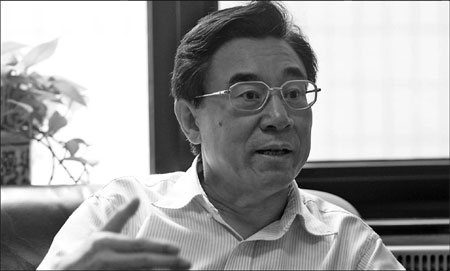How Chairman became President
Updated: 2011-07-31 08:31
By Eric Jou (China Daily)
|
|||||||||||
|
Huang Youyi says he learned to appreciate Chairman Mao's poetry more when he studied it in both Chinese and English. [Photo by Liu Zhe / China Daily] |
Eric Jou explores the trade of translation with one of China's top experts.
China's rampant foray into the English language has created a mess in the translation field with more and more amateur translators.
A key problem: The ability to speak English and Chinese does not make a translator, says Huang Youyi, vice-chairman of the International Federation of Translators and also of the Translators Association of China (TAC)
Huang, 58, the vice- president of China International Publishing Group, says that despite the rise in China's foreign language proficiency, particularly in English, there are still too few top-notch translators working.
"Society tends assume you are capable of doing translation if you know a foreign language, but that's not the case," said Huang."To know a foreign language is only one of the basic requirements."
To Huang being a top translator demands an understanding of culture and language combined.
Huang didn't exactly pick his career track but embraced the chance to study language, leading him to become a translator.
During the time that Huang was a university student, China was going through the changing times of the "cultural revolution".Huang, a Beijing native, was relocated to work in the countryside.It wasn't until 1971 that he returned to school.
Recruited by Beijing Foreign Language Institute, now Beijing Foreign Studies University, Huang was told that he was going to study language, and that language was English. Other students were steered to Arabic or other languages.
"I don't know why the choice was made that way," he says, but it didn't matter much to him. "I had no idea which language was easier to study."
Huang had little to no background in English language study, so he struggled to learn the language.He didn't even have textbooks during the first two years of his instruction.To further his studies and enhance his skills, Huang took to translation work, translating Chinese language newspapers to English and then comparing his work to the English dispatches.
After university, Huang was assigned to work for the China International Publishing Group.His very first job at the press was to learn how to type. Then he moved on to proofreading, proofing novels, poetry, and even Chairman Mao's poetry.
Huang says he learned more about Chairman Mao's poetry and rhetoric from proofreading the English translations than the original Chinese text itself.
"It was fun, you learned more about his ideas through proofreading the English translation because the Chinese poetry is highly condensed, you know the character but you may not know the meaning," said Huang."But when I did the proofreading I had to read carefully. So very often the English explains the meaning of the Chinese in a more accessible way."
Strongly impressed by the power of translation, Huang recognized it was more than just translation of words, "it's translation of two different cultures".
Eager to become a better translator, Huang went to pursue a master's degree in journalism at the University of Massachusetts at Amherst.Unfortunately that school did not have a journalism program, so Huang ended up studying American history instead.
Huang says that one of the best examples of the need to understand cultures is the Chinese phrase "Tao Guang Yang Hui", which translates into hide your light or ability to get an upper hand later.
"People in publishing and the mainstream Chinese media like to use the phrase 'keep a low profile'.This was a phrase used by Deng (Xiaoping) in 1991 when the Soviet Union collapsed," said Huang.
"But because the phrase has a classic meaning, people tend to refer to the original meaning of 'lie low when in difficulty to gain the upper hand later', but what Deng meant was that we should keep a close eye on international development, do our own business and not raise the banner and shout communism.What Deng meant was to keep a low profile."
Huang says his biggest mark in the translation world is not so much his current work in translation, but a piece of Chinese-to-English translation he did in his late 20s.
In the late '70s early '80s Huang was selected as part of a group of translators to translate the Chinese Constitution from Chinese to English.One part of the translation that stuck out to him the most was the term "chairman". Huang thought the term, while commonly used when referring to Chinese leaders, was outdated and incorrect.He believed the term should have been "president", and he pushed for it.
"I said that if you are chairman you have to chair a committee but chairman sounds very good to the Chinese, president sounds too foreign. Other senior translators said, 'We have Chairman Mao, Chairman Liu before, in the future we will still have chairman and chairman in Chinese should be understood as president even if there is no committee.'
"But I said why don't we try and put it in as 'president'? And we got away with it, now we have President Hu and President Jiang."
Having spent nearly 40 years in the language business, Huang, says that translation work is a never-ending study.
"There's no end in pursuing proficiency, the best part of being a translator/interpreter is that you are constantly learning the two languages and cultures behind them all the time," said Huang.
You can contact the writer at ericjou@chinadaily.com.cn.
